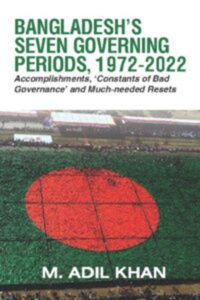by Taj Hashmi 11 January 2024
Adil Khan, Bangladesh’s Seven Governing Periods,1972-2022: Accomplishments, ‘Constants of Bad Governance’ and Much-needed Resets, Publisher: South Asia Journal, Colts Neck, NJ 07722. ISBN: 978-0-9995649-9. To purchase, contact: info@southasiajournal.net. USA US$ 28.00 India, Bangladesh and Pakistan INR750.00
Although the title may appear verbose, this work is considered a “must-read” for those studying the political economy of post-Liberation Bangladesh. The book delves into bad governance and underdevelopment issues, offering potential solutions to these problems. Its insights are precious for those seeking a comprehensive understanding of the country’s political and economic landscape, including possible solutions to these problems. Its insights are precious for those seeking a thorough knowledge of the country’s political and economic landscape.
The book in question is an extensively researched, meticulously analyzed, and well-crafted work on modern and contemporary Bangladesh. Its contents are poised to serve as an invaluable resource for experts from a diverse range of disciplines, looking to gain insight into the governance process and the development challenges faced by the nation. The book is equally relevant to the layman seeking to gain a deeper understanding of these issues. Its comprehensive coverage of the subject matter makes it an indispensable tool for anyone seeking clarity on the governance and developmental landscape of Bangladesh.
The book in question is an extensively researched, meticulously analyzed, and well-crafted work on modern and contemporary Bangladesh. Its contents are poised to serve as an invaluable resource for experts from a diverse range of disciplines, looking to gain insight into the governance process and the development challenges faced by the nation. The book is equally relevant to the layman seeking to gain a deeper understanding of these issues. Its comprehensive coverage of the subject matter makes it an indispensable tool for anyone seeking clarity on the governance and developmental landscape of Bangladesh.
The volume offers a comprehensive appraisal of the seven governance periods and their respective characteristics, policy decisions, actions, and outcomes. The author elucidates the book’s primary objective of proposing a viable approach to eradicating the Constants of Bad Governance (CoBGs) while simultaneously sustaining economic growth momentum achieved by the country. Additionally, the book aims to strengthen the democratic governance and rule of law that have experienced regressive trends recently. The work also presents recommendations to foster an inclusive Bangladeshi nationhood and to encourage behavioral changes that promote ethical and moral values for a decent Bangladesh.
Adil Khan expounds upon his methodology, which entails consulting credible academic and journalistic works, which he meticulously cites in the endnotes. However, one may point out that the author’s quasi-exclusive dependence on online materials is rather problematic. Instead, he should have utilized published monographs and edited volumes on topics that he addresses in this work as well. Furthermore, it should be noted that online materials lack longevity and often disappear without a trace. Nevertheless, this well-written piece of scholarship showcases the author’s immense knowledge of the subject matter. The proficient use of facts and his own analyses, as demonstrated throughout this volume, is a testament to his extensive experience as the former Chief of the Socio-Economic Governance and Management Branch of the UN Department of Economic and Social Affairs (UNDESA).
The author posits that it is likely to stimulate further discourse surrounding the facts presented, issues raised, and lessons learnt, with the hope that such discussions and debates will serve to foster the development of favourable characteristics and increase comprehension of the factors that contributed to Bangladesh’s advancement, as well as those that impeded progress. It is suggested that through rigorous evaluation of successes, and by identifying and implementing measures to sustain them, we can remedy mistakes and continue our forward momentum.
This publication introduces a new framework to comprehend the recurring governance failures in Bangladesh, namely the “Constants of Bad Governance” (CoBGs). Constants, as a mathematical term, imply something that remains unchanged. In Bangladesh’s seven governing periods, CoBGs refer to the persisting issues or irregularities in governance that have cumulatively piled up over time. By acknowledging these CoBGs, the book aims to provide a comprehensive understanding of the governance challenges that have plagued the country.
The book is divided into ten chapters, each one covering different areas and aspects of study. The Introduction describes the methodology used to prepare the volume and includes a definition of key concepts, such as “governing periods” and “Constants of Bad Governance”. Chapter 2 deals with the first governance period from January 1972 to August 1975. Chapter 3 covers the period of changeovers, anarchy, and transformations in the country during August to December 1975. Chapter 4 elucidates the “great resets” during the period of 1976-1981 under Ziaur Rahman. Chapter 5 sheds light on the “period of development and deceit” under General Ershad from March 1982 to December 1990. The return of parliamentary democracy in Bangladesh is discussed in Chapter 6. Chapter 7 elaborates on the Army-backed “caretaker government” between January 2007 and December 2008. The author has comprehensively elaborated on the problematic issue of development and underdevelopment under the Awami League government under Sheikh Hasina from 2009 to 2022 in Chapter 8. Chapter 9 is a critical appraisal of the problems of governance and development, which the author has aptly called “one step forward, two steps back” to highlight the counterproductive nature of the latest round of governance process since the ascendancy of Sheikh Hasina to power in 2009. Finally, Chapter 10 provides important suggestions on the much-needed resets for a meaningful change for the better for the country.
The author and publisher are deserving of our wholehearted congratulations and gratitude for having undertaken such an excellent work, encompassing all the essential elements in a mere 185 pages.
— Taj Hashmi, PhD, FRAS
(Author of Fifty Years of Bangladesh, 1971-2021: Crises of Culture, Development, Governance, and Identity, Palgrave-Macmillan 2022)
Retired Professor of History & Security Studies, APCSS, Honolulu, HI

